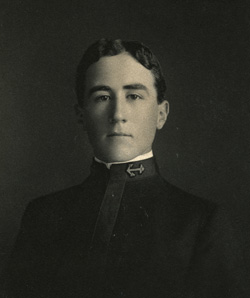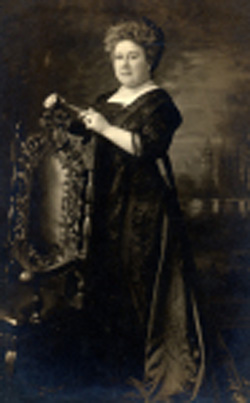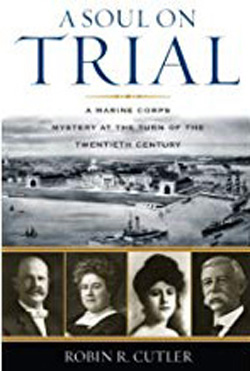Suicide or Murder? Clairvoyance or a Mother’s Intuition?
Posted on 06 August 2018, 9:26
The key issue involving the death of James Sutton, (below) a 22-year-old newly commissioned second lieutenant in the Marine Corps, was whether or not he had committed suicide. The other possibilities were that he was murdered by fellow officers, that he was shot in self-defense by the fellow officers, or that he accidentally shot himself while engaged in a brawl with one or more of the other officers. The case grabbed national headlines around the country, from the New York Times and Washington Post to the San Francisco Chronicle and Portland Oregonian. It involved politicians, the Secretary of the Navy, America’s only Catholic cardinal, high-ranking military officers, and distinguished lawyers and doctors.

Sutton’s death took place on the grounds of the Naval Academy at Annapolis, Maryland, then the basic school for marine officers, in the early morning hours of October 13, 1907. As he returned to his barracks with three fellow marine officers, after a night of socializing and drinking, Sutton was involved in an argument with one or more of them and an altercation resulted with shots being fired. It all ended with Sutton being shot in the head as one or two of the fellow officers reportedly pinned him to the ground. The statements made by the three fellow officers and others who came upon the scene were confusing and conflicting, but the board of inquest concluded that all the evidence was reliable and pointed to death by suicide, even though the trajectory of the bullet into the side of Sutton’s head above the right ear would likely have required him to pull the trigger with his thumb, unless, as one expert testified, he had been a contortionist. The possibility that he tried to shoot the person pinning him to the deck while using his thumb to pull the trigger also looms as a very reasonable possibility.
Sutton’s mother, Rosa Sutton, (below) had another reason to believe that “Jimmie” had not committed suicide. “Mama I never did,” Rosa recalled Jimmie’s words, when his apparition appeared to her some 12 hours after his death at his parents’ home in Portland, Oregon, just after they received a telegram advising of his death by suicide. “My hands are as free from crime as they were when I was five years old. Oh, Mother, don’t believe them. Adams struck me in the head with the butt of a gun and stunned me. I fell on my knees and they beat me worse than a dog in the street. Mamma dear, if you could only see my forehead you would know what they did to me. Don’t give way, for you must clear my name. God will give you the men (means?) to bring those men to justice.”

On October 16, three days after his death, Jimmie again allegedly appeared to his mother and said, “They put a bandage around my forehead and around to the back of my neck to try to hide what they had done. My face was all beaten up and discolored and my forehead broken and a lump under my left jaw. They put my body in a basement and left it there. Utley managed and directed the whole affair.” As Jimmie’s apparition spoke, his mother noted that he had his overcoat on and that he kept looking around for something. She asked him what he was looking for and he said that his shoulder knot (epaulet) was missing. Jimmie also told his mother that his watch had been broken with a kick as he lay on the ground. He added that he did not realize he had been shot until he “woke up in eternity.”
And so began Rosa Sutton’s two-year legal battle with the Navy Department to clear her son’s name. Indications are that there was a deeper reason for her crusade than simply setting the record straight and erasing the stigma of suicide. “As a Catholic, Rosa Brant Sutton believed suicide was a mortal sin,” author Robin R. Cutler explains in the Prologue of her book, A Soul on Trial, published by Rowman & Littlefield. “If the navy was correct, Jimmie would spend eternity in hell with no chance of being reunited with his loved ones.” Moreover, Jimmie’s admission to purgatory and then heaven, rather than hell, required, in Rosa’s mind, a priest to consecrate his grave at Arlington National Cemetery, something a priest was not allowed to do in the case of a suicide.

It seems strange that Rosa, described by an investigator as “shrewd” and a woman of “unusual intelligence,” would assume that a celestial judge would render justice based on the verdict of a terrestrial board of inquest. Seemingly, a celestial judge would most certainly know the true facts and direct Jimmie to the proper station in the afterlife without regard for the terrestrial finding. But Rosa, like many others of that time, apparently did not question Church dogma and doctrine.
Even before Jimmie’s death, and considering the three-hour time difference between Annapolis and Portland, Rosa sensed something was wrong with Jimmie. At about the time of his death, or shortly before, she felt as if a knife had struck her in the heart and cried out to her husband and two daughters that something had happened to Jimmie, after which she retired to her room and prayed. Rosa reported Jimmie coming to her in different ways in the weeks following his death.
Was Rosa Sutton delusional or was she really seeing and hearing from her discarnate son? In 1910, three years after the death of Jimmie and after his remains had received a proper Catholic burial, Rosa contacted Professor James Hyslop, who headed up the American Society for Psychical Research, and requested help in understanding what was going on with her visions. Hyslop sent an investigator, George A. Thacher, who lived near the Suttons, to determine if she actually had psychic or mediumistic abilities. Family members, including her husband and daughters, confirmed her visions and words on the night of Jimmie’s death and the next day as Jimmie told her of his innocence. Thacher reported that the family members, including two of Rosa’s sisters, had been accustomed to Rosa’s premonitions and visions over the years and had shrugged it all off as just so much “happy-hearted nonsense and chaff,” while Rosa, herself, didn’t know what to make of it. Moreover, as good Christians, all members of the family saw anything resembling Spiritualism as repugnant to them.
Rosa told Thacher that when she lived in Los Angeles, some 20 years earlier, her mother, who lived in Vancouver, Washington, appeared to her several hours before she received a telegram notifying her of her mother’s death. Before that, in 1884, she had a “knowing” that something had happened to her 18-year-old brother, Albert. As it turned out, Albert had died that day. That night, Albert came to her while she was sleeping and told her that her house was on fire. She assumed it was nothing more than a dream and attempted to go back to sleep. She then felt a touch on her shoulder, heard some noise in the house, and realized her house was actually on fire.
Rosa had a number of other visions and premonitions over the years, but they were nothing more than curiosities to her and irritations to her husband and some of her family members. James, her husband, saw it as simply a “mother’s intuition” of some kind, even though she had such visions not involving her children. Perhaps the most veridical vision came on December 16, 1910 when Thacher arrived at the Sutton home to interview Rosa Sutton. She told him that she had a dream or vision that very morning in which she saw a coffin. As she stepped up to the coffin, she saw the smiling face of Sister Dorothy (actually, Sister Dorothea), who had been her teacher, as well as her sister’s teacher, in Catholic school in Vancouver more than 30 years earlier. Her sister, Mary, was especially close to Sister Dorothy. Both Mary and Rosa were under the impression that Sister Dorothy was dead, and the purpose of the vision was unknown. But then, nearly three weeks later, on January 4, 1911, the Portland Oregonian carried a notice and photo of Sister Dorothea, reporting that she had died the previous day, on January 3. Thacher concluded that this was some kind of premonitory-type vision and that there was absolutely no deception on the part of Rosa or her sister. Rosa attended the funeral of Sister Dorothy and told Thacher that the coffin and room corresponded with those she had seen in her vision.
When Jimmie’s personal belongings arrived back home in Portland in a trunk, his watch was there with the crystal shattered. It had stopped at 1:15, believed to be the time of his death. As Rosa held the watch, it began ticking and stopped after three minutes. “Jimmie says that’s how long I suffered,” Rosa told her daughter, Rose, who replied, “Mamma, you have lost your mind.” The watch started up again and ran for two minutes. “That’s how much longer I lived,” Rosa relayed Jimmie’s words. The watch was taken to a jeweler, who had a difficult time restoring it to working order. It was given to another son, who reported that it stopped at 1:20 every day for about a year before being further repaired.
In addition to the shattered watch, Rosa’s visions were given some credence by the fact that the autopsy showed that Jimmie’s face was badly beaten, including the forehead and the lump under his left jaw, independent of the gunshot wound to the right side of his head, and the epaulet was missing from his military overcoat. Also, his head had a large bandage wrapped around it before his first burial.
Needless to say, Rosa’s visions were not admissible in the military court of inquiry that took place in 1909 in Rosa’s extensive efforts to have the suicide verdict overturned. Thacher and Hyslop concluded that they were veridical to a certain extent, but there was no way to tell how much her memory and those of family members had distorted the visions. Hyslop gave considerable weight to the possibility that the two names, Adams and Utley, were filled in by Rosa and family members to fit facts later developed. Her words, agreed to in substance by family members and others interviewed by Thacher, were not likely verbatim and only recalled and recorded in general at a later date. If those two names actually came through on the first and third days following Jimmie’s death, before the Sutton family had become aware of the circumstances and the other officers involved, it would certainly have added some strong evidence for psi or extra-sensory perception, even if not admissible in court. Of course, a defense counsel would likely argue that Jimmie had mentioned those names in the many letters he had written to his family, possibly even commenting on differences he might have had with his two fellow officers, thereby leading Rosa to associate those names with her visions.
The head injuries not associated with the gunshot wound, the bandaged head, the damaged watch, the missing epaulet, along with Rosa’s many other experiences attested to by others but not taken seriously by them, or even by Rosa, all suggested that Rosa had clairvoyant abilities of some kind. Although it is not a particularly strong case for such ability, it is certainly a very interesting and intriguing one.
It should be noted that the Catholic Church has changed its position on the fate of the suicide in the afterlife in recent years. According to the Catholic Education Research Center website, fear, force, ignorance, habit, passion, and psychological problems can all impede the will of the person and therefore the person may not be fully responsible or responsible at all for taking his or her life. Thus, it is in God’s hands as to how the person is judged and only He can provide the opportunity for salutary repentance.
I think Cutler should have been nominated for a Pulitzer Prize for her efforts in researching this case and writing about it, clearly a long-term and laborious undertaking. (See her website and special deal on the book at https://robinrcutler.com/a-soul-on-trial/) Considering the likelihood that the court’s decision would not have affected Jimmie’s fate in the afterlife one way or the other, one has to wonder if Rosa Sutton’s crusade, which reportedly cost the family $10,000 or more, quite a sum in those days, was worth it all, but in the very end Jimmie communicated to his mother what it was all about, and it does, in fact, seem that there was a bigger picture to it all. It was, Jimmy communicated, “to purify the Navy, Mamma.”
Michael Tymn is the author of The Afterlife Revealed: What Happens After We Die, Resurrecting Leonora Piper: How Science Discovered the Afterlife, and Dead Men Talking: Afterlife Communication from World War I.
Next blog post: August 20
|
Comments
Mike,
Great story!
These situations are more common then one may think, but what can they do? The authorities are not going to believe the average person about spirits saying this or that
about any situation.
In the case of this mother, although she was intelligent enough to maybe think about that her son’s spirit would be properly sorted out in the afterlife, people are very material-minded in general.
It would have mattered what happened to his body here in our world. I’m sure it made quite
a difference to her where her son’s body was going to be buried, whether on sacred ground and blessed by a priest.
In addition, it’s about his honor and what others would think as well. Suicide has a terrible stigma.
She knew and had faith in her abilities and what she saw. She was very brave to stand up about what she knew to be true in communication with her son. Her history of premonitions makes her more credible to me.
In the end, it’s about justice. Many spirits that communicate want justice (or revenge depending on their moral level) if they believe they have been wronged in this life (especially if they don’t understand why).
Yvonne Limoges, Sun 12 Aug, 21:29

Love reading all these responses and I am grateful to Mike for his thoughtful blog post.
When my daughter and I went to find Rosa’s grave at the Presidio just before the book came out we found they had dug it up to put it in a new sprinkler system pump. Given her obsession with proper burial, I wrote the head of the Presidio and immediately they fixed the grave, put new grass on it and sent me pictures. Of all the graves in that cemetery they should not have pickedefforts66 that one or any one to dig up for the sprinkler system. I guess her spirit was watching out when they thought no one would notice such an old grave.
Robin Cutler, Fri 10 Aug, 13:35

@Gordon Phinn
You’re right. The fact of spirit communication is the most important thing, not getting too wrapped up in particular words or ideas expressed. It will probably be a long time, if ever, before we can have clear telephone-like transmissions between our world and inhabitants of the various astral planes.
I wish I could be as sure as you that “we can all communicate with spirits if we but try.” We can all talk to spirits, but some of us (myself included) seem to draw a blank when trying to receive messages directly from them.
In Shakespeare’s Henry IV, Part I, the bragging Owen Glendower says, “I can call spirits from the vasty deep.” Hotspur replies, “Why, so can I, or so can any man; But will they come when you do call for them?”
Rick Darby, Wed 8 Aug, 16:32

A fascinating case for sure, so thanks for that. But for me it underlines why evidential spiritualism is insufficient for the evolutionary leap we are undergoing. There are, and likely always will be, sceptics, whether religious or materialist, who will find holes in any testimony. Its a state of affairs which has lasted over a century and shows no sign of stopping.
What is needed, i believe, is for everyone to act as though we were the multidimensional beings it is often claimed. We can all communicate with spirits if we but try. Getting details wrong is no big deal. We get things wrong talking to each other every day. If we were tested on those we’d fail every time.
gordon phinn, Wed 8 Aug, 04:15

A Good one again, MIke. Thanks. Keep ‘em coming.
Keith P in England, Tue 7 Aug, 20:08

Rick,
Yes, he was given a proper Catholic burial following an autopsy in 1909. It is not entirely clear from the records, but it appears that Rosa Sutton had some influence with the cardinal heading up the U.S. Catholic Church at the time.
Michael Tymn, Tue 7 Aug, 09:38

Was Jimmie eventually given a “proper Catholic burial” because the judicial inquiry determined that he had not committed suicide? It’s hard to be sure at this distance in time, with the lack of clear evidence, but of the three possibilities (suicide, accident, manslaughter) suicide seems the least likely.
It sounds like Rosa had paranormal abilities. You have to feel sorry for her, living with continual perceptions that her upbringing and her Church did nothing to help her understand. Let us hope that when she passed over she received better guidance and was reunited with Jimmie.
Rick Darby, Mon 6 Aug, 23:13

Mike a wonderful review - thanks so much! Karen
Karen Herrick, Mon 6 Aug, 22:30

Very interesting- thank you.
Paul, Mon 6 Aug, 18:42

Add your comment
|